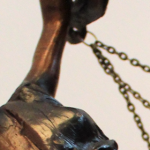Can you tell me a bit about the factors that went into the decision to launch the Fashion Law LL.M. and institute?
 When I first defined fashion law as a field and then launched the Fashion Law Institute, our aim was to establish fashion law as a mainstream academic discipline alongside banking law, sports law, securities law, and other existing fields. I heard a lot of laughter at first, but our goal was achieved faster than I’d dreamed. A handful of schools around the world now offer courses in fashion law, and there are fashion law sections in bar associations and many fashion law practice groups in law firms.
When I first defined fashion law as a field and then launched the Fashion Law Institute, our aim was to establish fashion law as a mainstream academic discipline alongside banking law, sports law, securities law, and other existing fields. I heard a lot of laughter at first, but our goal was achieved faster than I’d dreamed. A handful of schools around the world now offer courses in fashion law, and there are fashion law sections in bar associations and many fashion law practice groups in law firms.
The Fashion Law LL.M. grew out of our efforts to make our curriculum available to lawyers around the world who didn't go to Fordham for a J.D. Our initial response to the flood of requests was Fashion Law Bootcamp, our summer intensive courses in which attendees can either take the entirety of my Fashion Law course, or engage in in-depth study of a single issue, like fashion and technology. The Bootcamp is still going strong, and it’s a good way for those thinking about an LL.M. to start building their credentials in the field.
What's the general profile of students who take the LL.M. course?
Our Fashion Law LL.M.s come from around the world, but we’re particularly proud of the fact that we have roughly a 50/50 mix of international and domestic students. It’s unusual to have so many LL.M. students from the United States. The other students circle the globe, coming from countries like France, Venezuela, Japan, and Canada.
The education and work backgrounds of our students are also diverse. Some join our program directly from finishing their first law degrees; others have worked in law firms, fashion companies, and other roles—and many are still doing so while they pursue their LL.M. degrees on a part-time basis. But they all share the common goal of furthering their careers through in-depth training and gaining new contacts in the industry.
Where have the graduates gone on to work, and where is the most demand for this line of work in particular?
Our graduates have been brought on board in a range of places. Fashion brands, law firms, fashion-related non-profits, even companies that are not primarily fashion brands but are expanding into the fashion space. Serving as in-house counsel or establishing a fashion law practice are perhaps that most familiar options, but there are other tracks our alumni are taking as well, such as working for a company that provides brand protection or using legal expertise in a broader management position.
Anyone interested in pursuing a Fashion Law LL.M. should think about areas that are vital to the industry but that might not be the most popular subjects for blog posts and Instagram. Admiralty and maritime law may sound esoteric, but that’s shipping, and in an industry as global as fashion, there’s always need for lawyers who know how to move dresses and handbags across borders. Licensing is only growing; several years ago we had a panel featuring the first Game of Thrones jewelry, and since then licensed pop-culture fashion has become an industry in itself. And don’t forget privacy law—every time credit card number is stolen, another legislator asks retailers and their lawyers why.
All of which is to say that fashion law is more than intellectual property, knockoffs, and counterfeits—that’s where I personally started, but it has alwaysbro been much bigger than that.
What are some of the biggest legal challenges facing the fashion industry today?
Today’s biggest legal challenges reflect the broader challenges facing the industry as a whole. Technology has a been a central driving force: it’s not only creating cheaper, quicker, and higher quality means of copying, but it's also giving rise to substantial concerns over data privacy, supply chain monitoring, finance (for example fintech and alternative currencies), and the uncertain future of brick and mortar retail and the real estate it occupies.
Fashion brands are also attracting considerable attention from investors with little to no previous connections to the industry; not understanding the language of contracts common among tech companies and investment banks can be disastrous. A designer who thinks that she is just getting a much-needed financial boost or has entered into a short-term collaboration could wake up to discover that she has lost her entire company—and even her name.
Are there any misconceptions about being a lawyer in the fashion industry that you'd like to address or debunk? Also: what advice would you give to prospective LL.M. students looking to break into the industry?
The advice that I gave law students on my original fashion law blog, Counterfeit Chic, still holds true today. Fashion law isn’t about shopping and celebrities, and you definitely should not pattern yourself after Elle Woods from Legally Blonde or be the billionth person to announce that you have “a passion for fashion.” Designers and brands are looking, first and foremost, for attorneys who understand their business and the law.
Study the industry. Learn about design. Excel at law. Most of all, make yourself valuable. The most important thing about you is not that you want to be hired, but that you can help designers, fashion houses, and stakeholders in the industry accomplish their goals.










